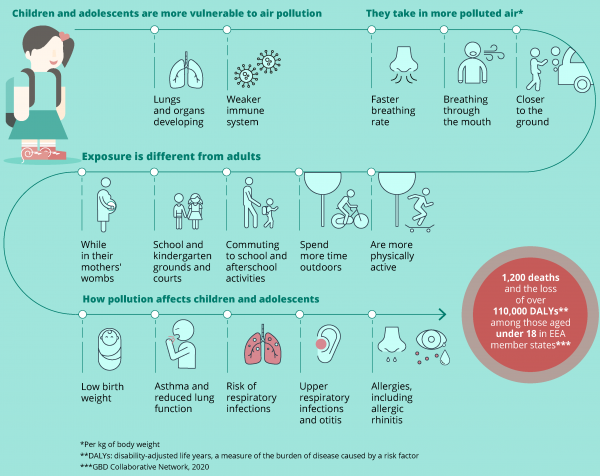|
|
WORLD |
|
Air Pollution and children's health: risks and solutions
 Categorie: World > International News
Categorie: World > International Newspublicat: 24.04.2023
Children are particularly vulnerable to air pollution, with over 1,200 deaths in people under 18 years old estimated to be caused by air pollution each year in European Environment Agency (EEA) member and collaborating countries.
Air pollution also causes reduced birth weight, asthma, decreased lung function, respiratory infections, and allergies in children and adolescents, as well as an increased risk of chronic diseases in adulthood. Traffic, heating, and industry are the main sources of air pollution in Europe; although emissions have decreased, air pollution levels are still not safe. Air quality policies should protect the health of children and adolescents by explicitly considering differences in their biology and exposure pathways.
Improving air quality around schools and kindergartens, in other child-centric settings, and during activities such as school commutes and sports can help reduce exposure. Children and adolescents cannot protect themselves from air pollution, nor can they vote or influence relevant policies.
Air pollution is a major issue affecting children's health in Europe. This is due to exposure to fine particles, nitrogen dioxide, and ozone, which can lead to respiratory and cardiovascular problems, as well as illnesses and premature deaths. Children are more vulnerable to the effects of air pollution because their organs are still developing and they need more air to support their growth and daily activities. Additionally, children spend more time outdoors, exposing them to pollutants.
Air pollution can impact children's health even before birth. Studies have shown that exposure to pollutants during pregnancy can have negative consequences on fetal development and the child's later growth. In the early stages of life, children may develop respiratory problems and allergies due to exposure to air pollution. This can also affect the immune system and increase the risk of respiratory infections.
Air pollution is also associated with cognitive and behavioral issues in children. Research suggests that exposure to pollutants can affect brain development and cognitive functions, such as attention and memory. Children living in areas with high levels of air pollution have a higher risk of developing asthma and other chronic respiratory diseases. There is also evidence suggesting that air pollution may contribute to the development of type 2 diabetes and obesity in children.
Reducing air pollution is essential for improving children's health and preventing long-term illnesses. This involves implementing measures to reduce emissions of gases and particles from industry, transportation, and other sources. It is important to consider the specific needs of children when developing air quality protection policies. This includes ensuring a healthy environment in the areas where children live, learn, and play.
Education and awareness are also key components in addressing the issue of air pollution and its impact on children's health. Parents, teachers, and communities need to be informed about the risks associated with air pollution and ways to protect children. Encouraging active and sustainable transportation, such as walking or cycling, can contribute to reducing air pollution and improving children's health. This can also help promote an active and healthy lifestyle.
Monitoring air quality and implementing effective warning and information systems can help protect children's health in situations with high air pollution. These can allow parents to take appropriate measures to reduce their children's exposure to pollutants. Improving indoor air quality in buildings, such as schools and homes, is also important for children's health. This can be achieved through proper ventilation, maintaining cleanliness, and using materials and products with low pollutant emissions.
Promoting international cooperation and the exchange of knowledge and best practices in the field of air quality can contribute to addressing the issue of air pollution and its impact on children's health globally. National and local authorities have a crucial role in implementing policies and measures to protect children's health from the effects of air pollution. This includes urban planning, emission regulation, and the development of green infrastructure. By implementing effective measures for reducing air pollution and promoting a healthy lifestyle, we can ensure a better future for our children.
Team PromoBusiness
Photo: europa.eu

|
|
world din aceeasi categorie:
|
||
|
|
|||
|
|
WORLD |
|
Cele mai citite știri și articole





